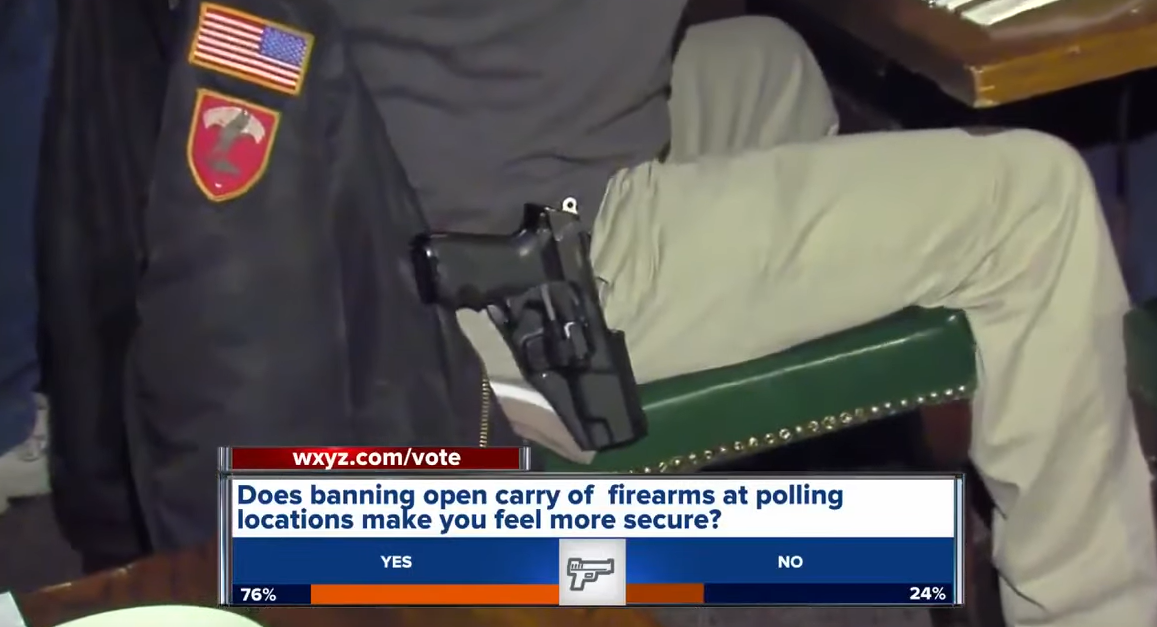By Michael Waldman\Brennan Center
Photos: YouTube Screenshots
Only 12 states and Washington, DC, prohibit both open and concealed carry of firearms at poll sites. It’s among the most unnerving statistics I’ve ever read in a Brennan Center report. There’s simply no reason for guns to be at polling places.

Failing to ban them at places where people vote seems like a dereliction of duty by state legislatures. And in many states, it really is as simple as that. But several states had previously implemented broad restrictions on gun possession, including at polling places, before the legal landscape for regulating firearms shifted following the U.S. Supreme Court’s decision in Bruen in 2022, by far the most extreme Second Amendment ruling ever. While Bruen compelled those states whose laws it throttled to restart the messy process of passing gun control legislation — often in the face of stiff opposition from a vocal minority of gun enthusiasts — the Court emphasized that restrictions on firearms in sensitive places like poll sites are constitutionally permissible.
The good news is that some states are making progress in keeping guns away from election sites. In November, the Michigan House of Representatives passed two bills to ban firearms at places where votes are cast. A bill has passed both houses of the New Mexico legislature and now awaits Gov. Michelle Lujan Grisham’s signature. Massachusetts and Virginia are considering similar legislation.
Perhaps the most encouraging development is the introduction of Assembly Bill 2642 in California by Assemblymember Marc Berman. Based on a model policy proposed by the Brennan Center and Giffords Law Center in our joint report on guns and voting, the Peace Act aims to safeguard both election workers and voters from intimidation, threats, and coercion involving the presence of guns wherever voting or vote-counting occurs, going further than any other state to keep violence out of the election process.
My colleagues Sean Morales-Doyle and Kendall Karson discuss the details in a recent piece on our website. The bill creates an automatic presumption that openly carrying a gun near a voting site constitutes illegal intimidation. This is simply common sense, and it patches a gaping hole in our web of voter protections.
When armed vigilantes dressed absurdly in tactical gear stalked ballot drop boxes in Arizona in 2022, law enforcement officials ultimately concluded they hadn’t broken any laws. An officer acknowledged to one observer that the behavior could be viewed as intimidation — it’s hard to know how else to interpret an armed man prowling around a voting site — but did nothing more. By removing any doubt as to the legality of armed intimidation, the Peace Act would prevent a similar occurrence in the Golden State.
The Peace Act includes a number of other important measures. Voters and election officials, for example, would be empowered to sue individuals who violate the law. And injured parties could secure injunctive relief.
The United States has a sordid legacy of voter intimidation, often racially motivated. Going back to the early 1830s, when a Pennsylvanian told Alexis de Tocqueville that Black Americans “are not disinclined to vote, but they are afraid of being maltreated . . . and the magistrates are unable to protect them in the exercise of their legal privileges.” And continuing through the horrors of the Ku Klux Klan and Jim Crow eras.
“The past is never dead. It’s not even past,” wrote Faulkner. Voter intimidation lives on in America. Let’s do our best, now, to make it part of the past.







